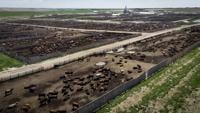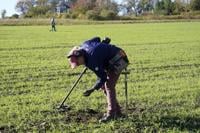CALGARY - A Chinese ban on şÚÁĎłÔąĎÍř beef that industry officials expected would be short-lived remains in place 17 months later, and industry representatives say they remain in the dark about the reasons.
China has been blocking beef shipments from şÚÁĎłÔąĎÍř processing plants ever since an atypical case of BSE, a rare variant of classical BSE (sometimes called mad cow disease), was found on an Alberta farm in December of 2021.
At the time, şÚÁĎłÔąĎÍř officials expressed little concern that the case would have lasting market impacts. Atypical BSE develops spontaneously in about one in every one million cattle and unlike the classic BSE strain — which has been linked to the fatal neurological disorder Creutzfeldt-Jakob disease — it poses no health risk to humans and is not transmissible.
While most of Canada's trading partners did not respond with any form of trade restrictions after the discovery of the case, South Korea and the Philippines joined China in suspending beef imports from this country.
However, both South Korea and the Philippines lifted the restrictions less than two months later, while China — which in 2021 was Canada's third-largest beef export market, importing $193 million worth of product — has still not resumed trade.
"Most countries do not close when you find an atypical case," said Dennis Laycraft, executive vice-president for the şÚÁĎłÔąĎÍř Cattle Association.
"It's just a few that did and you know, all those other countries opened up fairly quickly. So yeah, really the outlier here is China.”
Adding to the confusion, Laycraft said, is the fact that both Brazil and Ireland have also recently had their beef blocked by China due to cases of atypical BSE in those countries. But China has resumed beef trade with both of those countries, and it took only a short time — in the case of Brazil, only four weeks.
Laycraft said he doesn't know what the sticking point is when it comes to Canada, adding only that he doesn't believe there is a scientific explanation.
"We're pretty confident all of the technical requirements and information that was needed has been provided, to allow the decision to reopen," he said.
"We certainly don't believe there's, on that side, any reason for it not to be. They just, you know, haven’t responded.”
In 2019, China blocked canola shipments from two major şÚÁĎłÔąĎÍř companies, not long after Huawei executive Meng Wanzhou was arrested by şÚÁĎłÔąĎÍř authorities. That ban lasted for three years.
Tensions between Canada and China have recently ratcheted up again, with the şÚÁĎłÔąĎÍř government on Monday expelling Chinese diplomat Zhao Wei, alleging he was involved in a plot to intimidate Conservative MP Michael Chong and his relatives in Hong Kong.
The renewed tensions have even led the canola industry to express concern that China will retaliate to Canada's expulsion of its diplomat by blocking agricultural shipments.
But Gordon Houlden, director emeritus of the China Institute at the University of Alberta, said the beef industry's ongoing issue demonstrates that some of Ottawa's trade challenges with Beijing are pre-existing.
"Some people are jumping to the wrong conclusions and because of this latest exchange, the question of the diplomatic expulsions, they assume that it's going to immediately lead to a whole series of further restrictions," Houlden said.
"But some of these problems go back a long way."
Houlden said it's not abnormal for China to move slowly on the regulatory front, due to a combination of "bureaucracy and lethargy." He added that China is not always keen to wield trade as a weapon because it is a major exporter itself and knows such tactics can backfire.
However, he said the fact that China has lifted similar restrictions against beef imports from other countries suggests that at some level, politics is likely playing a role in the delay. Houlden added that while it's hard to know for certain what China's motivation is on any given issue, it's fair to say that Canada's current relationship with China is frosty enough that Beijing is unlikely to make an effort to fast-track the beef issue.
"I think we can surmise that right now politics is not in a position to help solve the problem, and in fact may be part of the problem," Houlden said.
Laycraft said during the year-and-a-half that the Chinese market has been closed, the şÚÁĎłÔąĎÍř beef industry has seen increasing sales into Japan, South Korea, Vietnam and other Asian countries. He said this has been due in large part to the Comprehensive and Progressive Agreement forTrans-Pacific Partnership, a free-trade agreement between Canada and 10 other countries in the Asia-Pacific region.
"We'd like to see things get back on a more normal track with China. We had some really good customers there that we were starting to build relationships with," Laycraft said.
“At the same time, we're doing very well in other markets in Asia ... So we’re not in the same vulnerable position that potentially other products from Canada are.”
Atypical BSE, just like classical BSE, is a progressive, fatal disease that affects the nervous system of cattle. However, classical BSE was responsible for the BSE epidemic that started in the United Kingdom in 1986.
Classical BSE was also responsible for Canada's own BSE crisis, which began in 2003 with the discovery of a domestic case and led to international borders being closed to şÚÁĎłÔąĎÍř beef exports.
This report by şÚÁĎłÔąĎÍř was first published May 11, 2023.








































